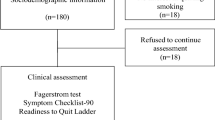Abstract
This paper reports the results of a postal questionnaire completed by 2343 smokers who had contacted a television company for help with stopping smoking. Of these, 1848 (78.9%) completed a follow-up questionnaire 1 year later. This indicated that 797 had tried to stop, 709 had tried to cut down, and 164 had become abstinent. Analyses show that the intention to try to stop smoking was dependent not only on the perceived health benefit, but also on the subjects' confidence that they would succeed if they tried to stop. As predicted by Weiner's [(1979). J. Educ. Psychol.71: 3–25] model of achievement motivation, those who attributed other smokers' failures at quitting to stable factors had lower expectancies of success, as had those who saw themselves as more addicted. When the follow-up data are considered, reported attempts at quitting were strongly related to previously declared intentions, and reported abstinence was related to previous confidence (expectancy of success) and perceived addiction. There is no support for hypotheses concerning self-other differences in attribution, or defensive attribution, in subjects' attributions for their own failures at cessation. Implications for antismoking interventions are discussed.
Similar content being viewed by others
References
Ajzen, I., and Fishbein, M. (1980).Understanding Attitudes and Predicting Social Behavior, Prentice-Hall, Englewood Cliffs, N.J.
Bandura, A. (1977). Self-efficacy: Toward a unifying theory of behavioral change.Psychol. Rev. 84: 191–215.
Bentler, P. M., and Speckart, G. (1979). Models of attitude-behavior relations.Psychol. Rev. 86: 452–464.
Duncan, O. D. (1966). Path analysis; Sociological examples.Am. J. Sociol. 72: 1–16.
Eiser, J. R. (1978). Discrepancy, dissonance and the “dissonant” smoker.Int. J. Addict. 13: 1295–1305.
Eiser, J. R. (1982). Addiction as attribution: Cognitive processes in giving up smoking. In Eiser, J. R. (ed.),Social Psychology and Behavioral Medicine, Wiley, Chichester, pp. 281–299.
Eiser, J. R., and Sutton, S. R. (1977). Smoking as a subjectively rational choice.Addict. Behav. 2: 129–134.
Eiser, J. R., Sutton, S. R., and Wober, M. (1977). Smokers, non-smokers, and the attribution of addiction.Br. J. Soc. Clin. Psychol. 16: 329–336.
Eiser, J. R., Sutton, S. R. and Wober, M. (1978a). “Consonant” and “dissonant” smokers and the self-attribution of addiction.Addict. Behav. 3: 99–106.
Eiser, J. R., Sutton, S. R., and Wober, M. (1978b). Smokers' and non-smokers' attributions about smoking: A case of actor-observer differences?Br. J. Soc. Clin. Psychol. 17: 189–190.
Fishbein, M. (1982). Social psychological analysis of smoking behavior. In Eiser, J. R. (ed.),Social Psychology and Behavioral Medicine, Wiley, Chichester, pp. 179–197.
Hunt, W. A., and Matarazzo, J. D. (1973). Three years later: Recent developments in the experimental modification of smoking behavior.J. Abnorm. Psychol. 81: 107–114.
Jones, E. E., and Nisbett, R. E. (1971). The actor and observer: Divergent perceptions of the causes of behavior. In Jones, E. E., Kanouse, D. E., Kelley, H. H., Nisbett, R. E., Valins, S., and Weinger, B. (eds.),Attribution: Perceiving the Causes of Behavior, General Learning Press, Morristown, N.J., pp. 79–94.
Kelley, H. H., and Michela, J. J. (1980). Attribution theory and research.Ann. Rev. Psychol. 31: 457–501.
Litman, G. K., Eiser, J. R., and Taylor, C. (1979). Dependence, relapse and extinction: A theoretical critique and a behavioral examination.J. Clin. Psychol. 35: 192–199.
Mausner, B., and Platt, E. S. (1971).Smoking: A Behavioral Analysis, Pergamon Press, New York.
McKennell, A. C., and Thomas, R. K. (1967).Adults' and Adolescents' Smoking Habits and Attitudes, Government Social Survey, H.M.S.O., London.
Raw, M. (1978). The treatment of cigarette dependence. In Israel, Y.,et al. (eds.),Research Advances in Alcohol and Drug Problems, Vol. 4, Plenum, New York, pp. 441–485.
Raw, M., and van der Pligt, J. (1981). Can television help people stop smoking? In Leathar, D. F., Hastings, G. B., and Davies, J. K. (eds.),Health Education and the Media, Pergamon Press, Oxford.
Robinson, D. (1972). The alcohologist's addiction: Some implications of having lost control over the disease concept of alcoholism.Q. J. Stud. Alcohol 33: 1028–1042.
Russell, M. A. H. (1971). Cigarette smoking: Natural history of a dependence disorder.Br. J. Med. Psychol. 44: 1–16.
Schachter, S. (1982). Recidivism and self-cure of smoking and obesity.Am. Psychol. 37: 436–444.
Schachter, S., Silverstein, B., Kozlowski, L. T., Perlick, D., Herman, C. P., and Liebling, B. (1977). Studies of the interaction of psychological and pharmacological determinants of smoking.J. Exp. Psychol. Gen. 106: 3–40.
Shaver, K. G. (1970). Defensive attribution: Effects of severity and relevance on the responsibility assigned for an accident.J. Personal. Soc. Psychol. 14: 101–113.
Sutton, S. R., and Eiser, J. R. (1984). The effect of fear-arousing communications on cigarette smoking: An expectancy-value approach.J. Behav. Med. 7: 13–33.
Weiner, B. (1979). A theory of motivation for some classroom experiences.J. Educ. Psychol. 71: 3–25.
Weiner, B., and Kukla, A. (1970). An attributional analysis of achievement motivation.J. Personal. Soc. Psychol. 15: 1–20.
Weiner, B., Russell, D., and Lerman, D. (1979). The cognition-emotion process in achievement-related contexts.J. Personal. Soc. Psychol. 37: 1211–1220.
Author information
Authors and Affiliations
Additional information
This research was facilitated to various extents by grants from the British Council, the Department of Health and Social Security, the Medical Research Council, and the Social Science Research Council, London. When the data were collected, all authors were at the Addiction Research Unit, Institute of Psychiatry, University of London.
Rights and permissions
About this article
Cite this article
Richard Eiser, J., van der Pligt, J., Raw, M. et al. Trying to stop smoking: Effects of perceived addiction, attributions for failure, and expectancy of success. J Behav Med 8, 321–341 (1985). https://doi.org/10.1007/BF00848367
Accepted:
Issue Date:
DOI: https://doi.org/10.1007/BF00848367




